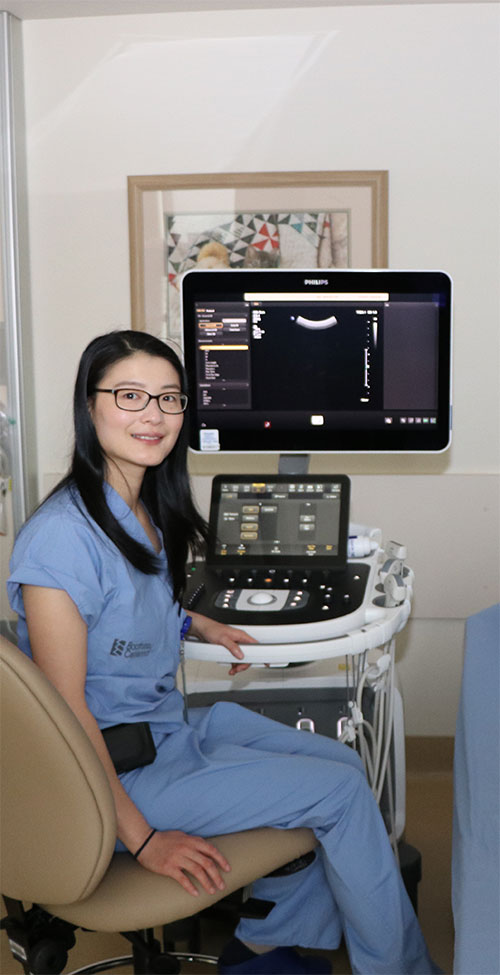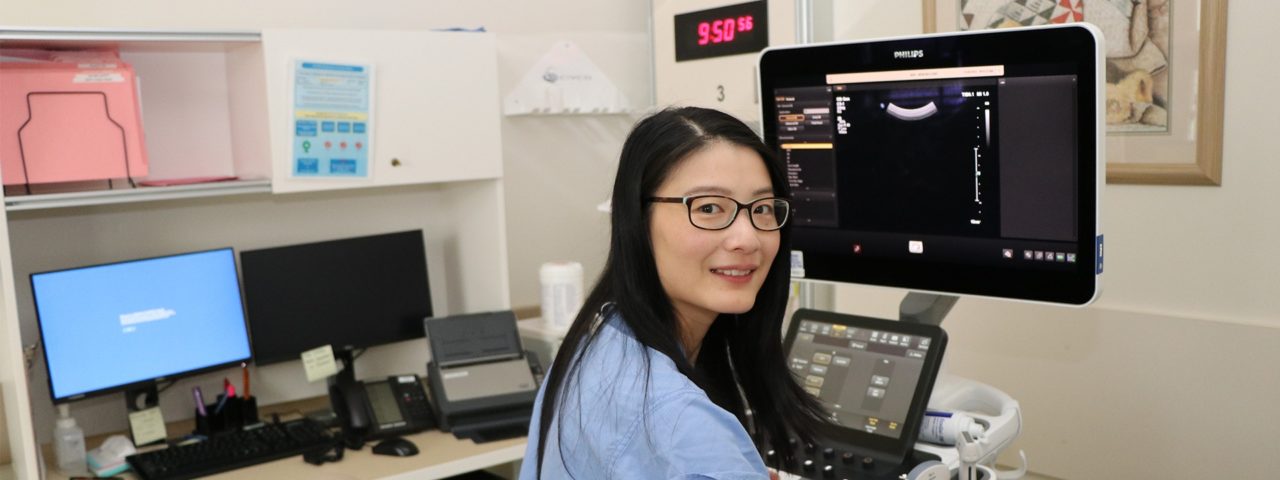New Maternal Fetal Medicine (MFM) Clinic Provides High-Risk Pregnancy Care Close to Home

When Robin Baweja got the news she was pregnant at 40 years old, she was already considered high risk. And while it was a joyous occasion, she started experiencing complications in her first trimester.
“Then I found out I was having twins,” says Robin. That pushed her further into the ‘high-risk’ category.
Her obstetrician kept a close eye on her, and in the third month of her pregnancy it was discovered that she had developed a shortened cervix, possibly due to the fact she was carrying twins. At that point, Robin was admitted to Markham Stouffville Hospital (MSH) and had surgery to decrease her risk of delivering prematurely. She was then referred to Dr. Hui Jue (Mickey) Zhang at the brand new Maternal Fetal Medicine (MFM) clinic.
In October 2019, MSH’s The Stollery Family Centre for Childbirth & Children officially opened the doors to its MFM clinic, which includes a dedicated specialist and an ultrasound funded through donor support. This means women experiencing a complicated or high-risk pregnancy no longer need to travel downtown for their care.
As well, with the addition of the new ultrasound machine, MSH is now able to care for more patients – both high-risk and low-risk – who couldn’t previously be accommodated.
The MFM clinic is led by Dr. Zhang, who is an obstetrician specializing in maternal fetal medicine for high-risk pregnancies, with extensive training to conduct highly specialized ultrasound scans.
“We can pick up much more on an ultrasound than previously possible,” says Dr. Zhang. While technology has advanced over the past 30 years, the ability to assess a highrisk pregnancy really comes down to the training, skills and expertise of the sonographer.
“It’s not just about obtaining the image, it’s also about knowing how to interpret it and obtain other images that are relevant to the diagnosis,” says Dr. Zhang, who reviews the pictures and provides a real-time interpretation to the patient, as well as a treatment plan that could include hospitalization or surgery.
High-risk pregnancies can result from a pre-existing maternal disease, such as Type 1 diabetes, or a genetic syndrome. Women who have had complications in previous pregnancies may also be considered high risk. As well, there can be issues with the fetus, such as a malformation or inappropriate growth.
“Today’s advancements in the quality of ultrasound has resulted in earlier identification of potential fetal issues and earlier intervention leading to better outcomes for both mothers and their babies,” says Dr. Zhang.
Attempts to establish MFM clinics at other community hospitals in the past have been largely unsuccessful. Learning from that, MSH engaged in careful planning with both sonographers and the MFM physician right from the start. The result is a successful clinic model where every professional understands and embraces the collaborative role each other plays.
“It’s beneficial for our technologists to be exposed to more high-risk obstetric ultrasounds and learn from the teachings of the MFM specialist,” explains Dr. Chris Stephen, Chief of Diagnostic Imaging at MSH.
Another challenge for community hospital MFM clinics is that the specialist works exclusively with high-risk women; Dr. Zhang has a busy low-risk practice as well. Furthermore, MSH developed a partnership with Mount Sinai Hospital where Dr. Zhang has also obtained an appointment within its maternal fetal medicine department.
This allows her to keep up-to-date with leading-edge care practices and bring those practices back to MSH. This arrangement also allows her to work with patients across both hospitals.
With Robin, Dr. Zhang discovered that despite the surgery, Robin’s cervix was still shortening, and she was again at risk of delivering at a significantly premature stage of pregnancy. At that point, Robin was transferred to Mount Sinai Hospital for about five weeks. With the help of Dr. Zhang, working alongside her obstetrician, Robin made it to full term. She gave birth to twins, Maya and Ishaan, at MSH.
“I honestly think I was very lucky because I had the luxury of being close to home,” says Robin. “You don’t want to be stuck on the 401 trying to get downtown [if you’re having complications].”
Though the MFM clinic has only been open for a short time, it’s been ramping up since the spring, helping women such as Robin. Already it’s fully booked three weeks out, just through word of mouth.
“Our patients are really happy with the service,” says Carol Hirst-Wilson, Ultrasound Team Leader in MSH’s Diagnostic Imaging Department. “It takes up less time, they’re in their own community, and they’ve been to this hospital before, so they feel at home. That makes a big difference.”
“Our community has been asking for this for years,” agrees Dr. Stephen. “And it has been a huge benefit.”
This article originally appeared in the October 19th issue of the Toronto Star.
